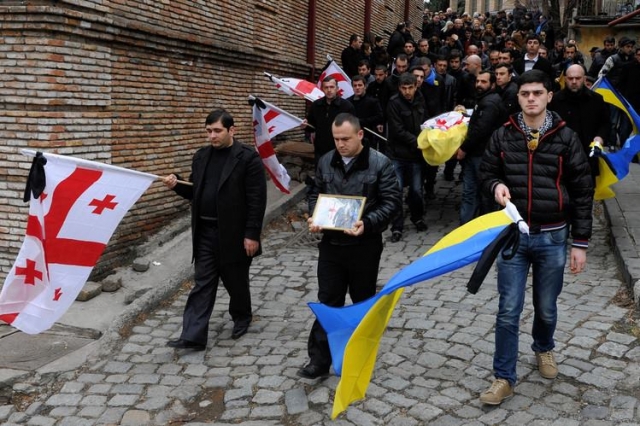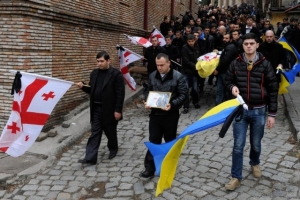Op-Ed: The West Must Be Serious in Its Support for Georgia and Ukraine
TBILISI - The recent collapse of Ukraine’s post-Maidan Revolution government, a brief war in the disputed Caucasus region of Nagorno-Karabakh and an announcement earlier this week by South Ossetia’s Russian-backed rebel leaders that they plan to hold a referendum on formally joining Moscow are a stark reminder for the West’s leaders that all is not well in the post-Soviet world.
For more than 20 years, presidents and prime ministers from Washington to Vienna have struggled to formulate a coherent and lasting policy towards the former Soviet Union’s 15 republics.
The early euphoria that swept the region shortly after the Soviet Union ceased to exist and gave way to the economic chaos and bloody separatist wars that claimed thousands of lives and fundamentally sabotaged the goodwill of the West.
The West, ever eager but woefully inadequate in its understanding of the vast complexities of the newly independent states, has vacillated between catering to the wishes of Russia at the expense of the other 14 states and taking firm steps towards shoring up the smaller, but no less important, nations on Moscow’s flank.
Russia has pursued a policy of subverting the West’s attempts to gain headway in a region that it considers its ‘near abroad’. Russian President Vladimir Putin has for years bristled at the notion that either the US or Europe has a strategic interest in the region. His worldview remains unchanged from his days as a KGB officer in the old German Democratic Republic.
It is because of his unwavering perspective that Putin has been able to undermine the efforts, or lack thereof, of successive Western governments who hoped to promote and expand democratic values throughout a group of diverse nations that had suffered for centuries under despotic foreign rule.
Moscow’s brutal realpolitik approach to its former imperial possessions has allowed it to subvert and control the development of each country by promoting endemic corruption and oligarchical power through cheap Russian-provided money and political support to the many authoritarian governments that rule from Minsk to Dushanbe.
Western leaders were quick to embrace popular revolutions in Georgia and Ukraine that brought down their corrupt and discredited Moscow-backed governments and ushered in short periods of reform and re-orientation towards a new Euro-Atlantic alliance.
But as the world saw in Russia in the early 1990s, when the short lived reform-minded government of Yegor Gaidar failed to deliver on its promise to capitalize and democratize society, the mood in the body politic can shift to such an extent that the rise of populist nationalists and ex-KGB agents becomes acceptable to the average citizen.
Georgia’s experiment with post-Soviet democracy, independent of Moscow’s corrosive influence, has been mixed. While recent reforms ended the failed state era of two decades ago, the country has yet to shed its habit of electing a personality rather than a policy that best suits the country’s interests.
The successive administrations of former President Mikheil Saakashvili and ex-Prime Minister Bidzina Ivanishvili were based less on the national will and rather focused on the individual merits of the two dominating personalities involved. In the case of both, each saw their support crumble and their administrations accused of forcing the country down the wrong path.
The West’s distaste for the bombastic demagoguery of Saakashvili and crude oligarchal authoritarianism of Ivanishvili tried their patience to the point that neither Washington nor Brussels takes much time to consider their strategic interests in Georgia as seriously as they did 10 years ago.
Ukraine, despite the on going bloody war with Russia and their separatist proxies in its eastern Donbass region, remains a country with massive human and economic potential. One that is fueled by a powerful and vocal civil society that would make both the United Kingdom and the United States envious. Though their attempts at civil unrest have not led to a complete cleansing of its morally bankrupt national government, the Ukrainian population remains resolute in its desire to transform the country from a republic of disgustingly wealthy oligarchs into a modern European state, wholly liberated from the worst legacies of Soviet psychology and Russian neo-imperialists.
Though the West's patience with Ukraine's business-as-usual tycoon-turned president, Petro Poroshenko, has nearly evaporated after nearly two years of unfulfilled reform promises and growing accusations of state-sanctioned corruption, walking away from Ukraine and the 50 million souls living within her borders would be to admit that the Kremlin was right all along; that the West cares nothing for the will of people who long for their rightful place at the table of law abiding, patriotic nation states.
By leaving Georgia and Ukraine adrift the West risks losing two of the key players in the post-Soviet zone. Georgia has been the most successful of the former republics – outside of the Baltics – regarding the rule of law, freedom of speech and ease of doing business. Though both Saakashvili and Ivanishvili were guilty of authoritarianism, the democratic process remains robust and deeply ingrained in Georgians’ minds.
Western countries must come to the realization that support for Georgia and Ukraine must be at the center of their foreign policy agendas. Moscow’s ability to foment wars in the South Caucasus or separatism in the Donbass basin force leaders in London and Berlin to come to the realization that a strategic plan must come into focus before the local populations turn on the hard-fought reforms and democratic paths that they’ve longed for since the 1991 Belavzha Accords officially dissolved the world's first Communist state.
If the West fails to embrace the ambitions of the Georgian and Ukrainian people by brining them into the European family, it will inevitably lead to the end of both Tbilisi’s and Kiev’s drive towards finding an independent voice that is free from the will of Putin’s Russia.
By Nicholas Waller












